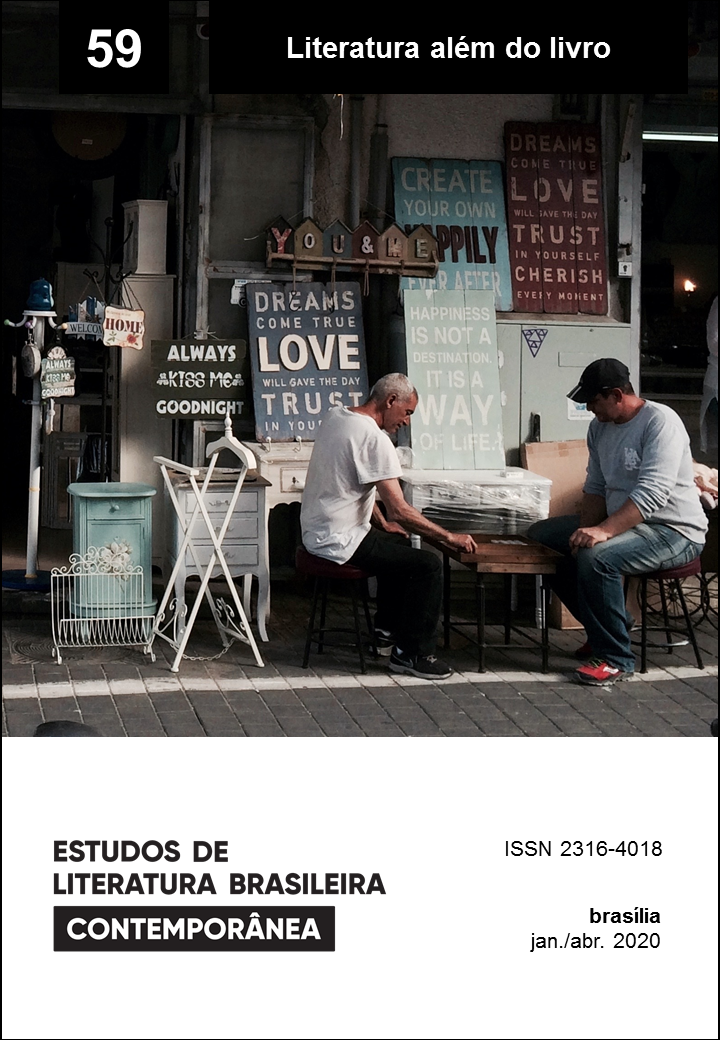Luiz Ruffato’s Refraction of Realism: A Permanent Hell
DOI:
https://doi.org/10.1590/2316-4018599Keywords:
Luiz Ruffato, realism, modernization, Brazilian society, rural exodusAbstract
The essay has as its theoretical-critical basis the idea that representations are conventions for understanding and modeling social structures and relationships, as well as practices that assign meanings to the real, with effects on their construction (Bourdieu, 1996, p.107- 116). Considering also the concept of refracted realism (Pellegrini, 2018, p.17), we analyze how Luiz Ruffato's Inferno Provisório (2016) represents, through the specific treatment of literary categories, aspects of Brazilian society, such as inequality and exploitation combined with the conservative modernization of recent decades, creating a particular way of capturing the relationship between individuals and society.
Downloads
References
ANDERSON, Benedict (2008). Comunidades imaginadas. São Paulo: Companhia das Letras.
AUERBACH, Eric (1976). Mimesis. São Paulo: Perspectiva.
AZEVEDO, Aluísio (1999). O cortiço. São Paulo: Moderna.
BOURDIEU, Pierre (1966). A força da representação. In: BOURDIEU, Pierre. A economia das trocas linguísticas: o que falar quer dizer. São Paulo: Edusp. p. 107-116.
CANDIDO, Antonio (1995). De cortiço a cortiço. In: CANDIDO, Antonio. O discurso e a cidade. São Paulo: Duas Cidades. p. 123-152.
CANDIDO, Antonio (2010). Os parceiros do Rio Bonito. Rio de Janeiro: Ouro Sobre Azul.
DEALTRY, Giovanna (2009). Cidades em ruínas: a história a contrapelo em Inferno Provisório, de Luiz Ruffato. Estudos de Literatura Brasileira Contemporânea, Brasília, n. 34, p. 209-221, jul./dez.
HARRISON, Marguerite Itamar (2007). Uma cidade em camadas: ensaios sobre o romance Eles eram muitos cavalos, de Luiz Ruffato. Vinhedo: Horizonte.
OLIVEIRA, Marcus Vinicius Ferreira (2017). A ruína e a máscara: as contradições de uma modernização conservadora. Tese (Doutorado em Letras) ”“ Universidade Federal de Juiz de Fora, Juiz de Fora. Disponível em: https://bit.ly/35rRjnM. Acesso em: 23 jun. 2019.
PELLEGRINI, Tânia (2018). Realismo e realidade: um modo de ver o Brasil. São Paulo: Alameda.
RANCIÈRE, Jacques (2014). A política da ficção. Lisboa: Ed. J. F. Figueira e V. Silva.
RUFFATO, Luiz (2006). Literatura com projeto. Entrevista concedida a Heloisa Buarque de Hollanda e Ana Ligia Matos. Z Cultural, Rio de Janeiro, ano 3, n 1, 10 mar. Disponível em: https://bit.ly/2rYWDS6. Acesso em: 14 jan. 2019.
RUFFATO, Luiz (2016). Inferno provisório. São Paulo: Companhia das Letras.
RUFFATO, Luiz (2019). Novo romance de Luiz Ruffato retrata falta de diálogo entre as classes sociais no Brasil. Entrevista concedida a Ruan de Souza Gabriel. O Globo, Rio de Janeiro, 8 maio. Disponível em: https://glo.bo/36pqmCL. Acesso em: 22 maio 2019.
SCHØLLHAMMER, Karl Erik (2016). Um mundo de papel: reflexões sobre o realismo de Ruffato. Alea, Rio de Janeiro, v. 18, n. 2, p. 232-242.
SOARES, Raoni Damiano (2017). Recordação e esquecimento em Inferno Provisório: Mamma, son tanto Felice, de Luiz Ruffato. Dissertação (Mestrado em Letras) ”“ Universidade Federal de Ouro Preto, Mariana. Disponível em: https://bit.ly/2tsPx8I. Acesso em: 23 jun. 2019.
VETORASSI, Andrea (2018). Laços de trabalho, fios da memória e redes migratórias. Curitiba: Appris.
WILLIAMS, Raymond (2001). The long revolution. New York: Broadview Press.
Downloads
Published
How to Cite
Issue
Section
License
Authors who publish in this journal agree to the following terms:
a) The authors maintain the copyright and grant the journal the right of first publication, the work being simultaneously licensed under the Creative Commons Attribution License-Non Commercial 4.0 which allows the sharing of the work with acknowledgment of the authorship of the work and publication this journal.
b) Authors are authorized to enter into additional contracts separately, for non-exclusive distribution of the version of the work published in this journal (eg publish in institutional repository or as a book chapter), with authorship recognition and publication in this journal.
c) Authors are allowed and encouraged to publish and distribute their work online (eg in institutional repositories or on their personal page) after the editorial process, as this can generate productive changes, as well as increase the impact and citation of published work (See The Effect of Free Access).
d) The authors of the approved works authorize the magazine to, after publication, transfer its content for reproduction in content crawlers, virtual libraries and the like.
e) The authors assume that the texts submitted to the publication are of their original creation, being fully responsible for their content in the event of possible opposition by third parties.


